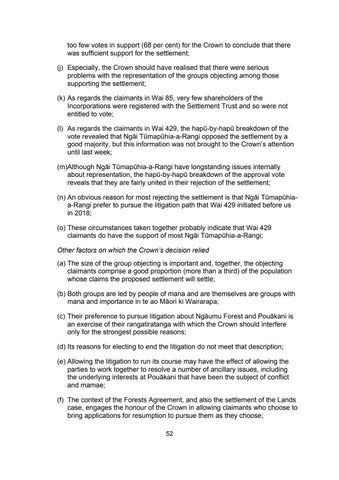too few votes in support (68 per cent) for the Crown to conclude that there was sufficient support for the settlement; (j) Especially, the Crown should have realised that there were serious problems with the representation of the groups objecting among those supporting the settlement; (k) As regards the claimants in Wai 85, very few shareholders of the Incorporations were registered with the Settlement Trust and so were not entitled to vote; (l) As regards the claimants in Wai 429, the hapū-by-hapū breakdown of the vote revealed that Ngāi Tūmapūhia-a-Rangi opposed the settlement by a good majority, but this information was not brought to the Crown’s attention until last week; (m)Although Ngāi Tūmapūhia-a-Rangi have longstanding issues internally about representation, the hapū-by-hapū breakdown of the approval vote reveals that they are fairly united in their rejection of the settlement; (n) An obvious reason for most rejecting the settlement is that Ngāi Tūmapūhiaa-Rangi prefer to pursue the litigation path that Wai 429 initiated before us in 2018; (o) These circumstances taken together probably indicate that Wai 429 claimants do have the support of most Ngāi Tūmapūhia-a-Rangi; Other factors on which the Crown’s decision relied (a) The size of the group objecting is important and, together, the objecting claimants comprise a good proportion (more than a third) of the population whose claims the proposed settlement will settle; (b) Both groups are led by people of mana and are themselves are groups with mana and importance in te ao Māori ki Wairarapa; (c) Their preference to pursue litigation about Ngāumu Forest and Pouākani is an exercise of their rangatiratanga with which the Crown should interfere only for the strongest possible reasons; (d) Its reasons for electing to end the litigation do not meet that description; (e) Allowing the litigation to run its course may have the effect of allowing the parties to work together to resolve a number of ancillary issues, including the underlying interests at Pouākani that have been the subject of conflict and mamae; (f) The context of the Forests Agreement, and also the settlement of the Lands case, engages the honour of the Crown in allowing claimants who choose to bring applications for resumption to pursue them as they choose; 52
Issuu converts static files into: digital portfolios, online yearbooks, online catalogs, digital photo albums and more. Sign up and create your flipbook.



